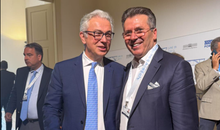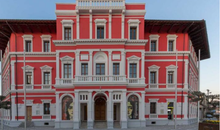
 Flash News
Flash News
Today, Youth Day, but where are the young people?! 570 thousand less in two decades

Young people are the first source of hope for a better future, they are the backbone of any society, they represent the best of the present and of what is to come. They must be offered perspective as the best way to stop the hemorrhaging that has engulfed the country today
EDITORIAL- December 8, Youth Day in Albania, is remembered as a historical moment, when a group of students and lecturers of the University of Tirana, in 1990, became the protagonists of the great historical turning point, for the change of the dictatorial regime.
It was a time of great dreams and hopes. In fact, a lot has changed since then. The country, much freer than before, has moved forward, has opened up to the world, the economy has grown and diversified. Today's young people are much different than at that time, they have endless opportunities and choices than 30 years ago. Their ambitions have increased, but so have their expectations for the future. And young people's aspirations are central to their investments in human capital, educational choices and labor market outcomes.
But, in these three decades, reality does not seem to have come close to the ambition of young people. They, by and large, are turning out to have chosen to fulfill them elsewhere. INSTAT data shows that in 2022, the 0-24 age group accounted for only 30% of the population, up from nearly 50% in 2011 (the earliest data available from INSTAT). In the numbers, there are about 570 thousand young people and children less than two decades ago (from 1.42 million in 2001 to 827 thousand in 2022 - see the chart).
There are many reasons. One of them is the gradual aging of the population, a somewhat normal trend that has come with the country's development and lifestyle changes. The highest effect is given by emigration, which, not only has not stopped, but after 2016 has accelerated, with over 70% of refugees under the age of 24, as it has resulted from the data of asylum seekers who reports Eurostat. Families with children are leaving, as well as young people who would otherwise have started families in the country. A recent study showed that there are about 17,000 students who study abroad and have no intention of returning.
The causes must be seen as chain-linked. They start with the education system. The latest data from "PISA 2022", an international study that was launched by the OECD in 1997, found that Albania ranks second to last in the region for students' skills in mathematics, reading and science, which have deteriorated, leaving behind only Kosovo, which is a new state and without much tradition for its own historical past.
The pandemic is just an excuse, as from the assessment of students' progress in mathematics compared to the PISA 2018 program, Albania has a drop of 69 points, the highest among the 80 countries tested. Many middle-class families are leaving, choosing to make sacrifices to educate their children abroad. Even government funding for education seems to precede the decline in the quality of education.
INSTAT data show that the expenses for this sector, in relation to the Gross Domestic Product (GDP), fell by 0.2 percentage points in 2022 on an annual basis, going down to 2.9% of the GDP, from about 5% which is the average of the Union European.
Funds for research and development, an instrument that creates opportunities for young people, are the lowest in Europe relative to the size of the economy. The lack of investment in human capital is one of the main reasons, which not only demotivates young people, but also negatively affects the productivity of the economy.
This brings us to the next factor, that of the labor market. Albania continues to have the lowest average salary in Europe, which is a reflection of the economic model so far, where the main advantage has been the free arm of the workforce.
New jobs continue to be mostly in unskilled sectors, which are being rejected by today's ambitious youth. Qualified workers, according to recruitment agencies and labor market experts, are leaving to emigrate.
Politics, old or new, is the youth's next frustration. The political class, mired in scandal after scandal, is no longer evoking hope.
It is true that today's Albania is better than the Albania of the early 1990s. But it is equally true that today's Albania is far from what a student of 1990 expected.
Unlike the energy of the 90s, the muted response they are choosing is immigration. The justification that this happens in all the countries of Eastern Europe and that we cannot compete with the salaries of Germany fades away when you compare the figures of the escape in relation to the population, where Albania ranks with the countries that are at war today!
Young people are the first source of hope for a better future, they are the backbone of any society, they represent the best of the present and of what is to come.
They should be offered perspective, including quality work and education and training opportunities for the Albania of the future, and the participation of young people in society should be supported, as the best way to stop the hemorrhage that has engulfed the country today./ Monitor
Latest news


Two vehicles collide on the Elbasan-Peqin axis, drivers injured
2025-07-05 19:26:29

What does Zelenskyy have more than Zegjineja?
2025-07-05 18:45:26

Fiscal peace, but at a cost
2025-07-05 18:00:10
'Bankers' tax evasion, Chinese CEO and former director jailed
2025-07-05 17:39:21
Kyle Walker joins English club on two-year deal
2025-07-05 17:20:24
Two cars collide on the Saranda-Delvina axis, 4 injured
2025-07-05 17:05:29
Touching gesture! Liverpool will pay Jota's family's salary until 2027
2025-07-05 16:45:18
The zodiac signs that cheat most often
2025-07-05 16:25:53

"I asked for the dismissals", Dredha tries to soften Rama's 'blow' in Vlora
2025-07-05 15:48:49
Bomb threat in Parliament, prosecutor: It was a lie
2025-07-05 15:22:28

Bardhi: The recount revealed how greedy Zeqine Balluku is in stealing
2025-07-05 14:44:29
Knife wound on the secondary road Tirana-Durrës, perpetrator sought
2025-07-05 14:37:54
Tears and pain, Diogo Jota is escorted to his final home
2025-07-05 14:21:34
Success starts with yourself! Simple ways to invest in personal development
2025-07-05 13:58:50
Unlicensed firearms found in apartment, 50-year-old arrested in Lushnje
2025-07-05 13:43:11

Tirana Court remands Skerdi Sina to prison
2025-07-05 12:59:34
Cocaine laboratory in Greece, here are the Albanians arrested and wanted
2025-07-05 12:40:16
Directed Justice/Vangjeli: SPAK does not investigate any scandal involving Rama
2025-07-05 12:22:03

Bomb alert, Police remove MPs and media from Kosovo Parliament building
2025-07-05 11:48:16
"The will of the people" and the irony of ordered resignations
2025-07-05 11:32:05
Summer drowning risk: How to enjoy the water without risking your life
2025-07-05 11:20:27
Fire situation in the country, 16 fires reported in 24 hours, 4 still active
2025-07-05 11:07:04
Car hits pedestrian at white lines, injured in serious condition in Vlora
2025-07-05 10:59:58
Mosquito-borne diseases are a growing problem in Europe
2025-07-05 10:44:13



One of Sweden's most dangerous and wanted criminals arrested in Turkey
2025-07-05 09:38:29
Foreign exchange/ How much foreign currencies are bought and sold today
2025-07-05 09:18:38

"Don't be influenced by the opinions of others", today's horoscope
2025-07-05 08:40:50

Morning Post/ In 2 lines: What mattered yesterday in Albania
2025-07-05 08:02:07

Trump says he's ready to raise tariffs to 70% on some countries
2025-07-04 22:35:52
Tre shenjat e zodiakut që do ‘pasurohen’ në Korrik
2025-07-04 22:05:09
Gaza War: Hamas Accepts US Proposal for 60-Day Ceasefire
2025-07-04 21:50:10
Autocracy in Albania, Fuga: Governance has gotten out of control
2025-07-04 21:40:51
Meta: Agriculture on credit, the new fraud!
2025-07-04 21:26:39




Vote recount in Durrës ends without changes
2025-07-04 20:12:54
Gas station explodes in Rome, 25 injured (VIDEO)
2025-07-04 20:00:20

These afternoon habits often sabotage weight loss
2025-07-04 19:39:28
Former Arsenal player Thomas Partey accused of rape
2025-07-04 19:24:21
Shepherd disappears without a trace in Delvina
2025-07-04 19:14:31

Bardho gave Zegjine's mandate/Braho: Unfair! It violates the electoral system
2025-07-04 19:01:08


Rapid developments in the Sultanates!
2025-07-04 18:00:06



Italy tightens rules for skateboard traffic
2025-07-04 17:20:18

Unusual for the time, dense fog covers the coast of Vlora
2025-07-04 16:48:01


Accident on the Shkodra-Lezhë axis, one dead and 3 injured
2025-07-04 16:14:19
Albania with fewer requests for asylum and Albanian citizenship in 2024
2025-07-04 16:06:57

Albania last for quality of life, DP: Technical government is the solution!
2025-07-04 15:42:30
Nico Williams says "No" to Barcelona, signs with Athletic Club until 2035
2025-07-04 15:33:35
Fires in the country, four fires are still active, what is the situation?
2025-07-04 15:24:20

Summer brings big changes for these 4 zodiac signs
2025-07-04 15:00:04
Osmani: MPs need to agree to a secret ballot for the Speaker of Parliament
2025-07-04 14:51:09
Serious accident on the Peqin-Elbasan axis, two injured
2025-07-04 14:37:56

GJKKO leaves in force the security measure for the head of the KPP
2025-07-04 13:58:17
Who will replace Ilir Meta and take over the leadership of the PL?
2025-07-04 13:50:36
Berisha: Dismissal of directors in Vlora, another act of 'scapegoats'
2025-07-04 13:41:46




Librazhd/ In a serious psychological state, the young man consumes pesticides
2025-07-04 13:05:07


Weapons trafficked from Kosovo to Albania, two arrested, 8 pistols seized
2025-07-04 12:33:28
Konsumimi i tepërt i çokollatës, ja cilat janë dëmet që shkakton në organizëm
2025-07-04 12:23:35

Fires in the country, 21 fires in the last 24 hours, 4 still active
2025-07-04 12:00:19
WB calls for debt transparency: Albania to publish details of every loan
2025-07-04 11:50:05
Changes in the State Police, new names expected to lead 5 police stations
2025-07-04 11:40:06

The race for the head of the BKH, the third phase on July 11
2025-07-04 11:20:23

